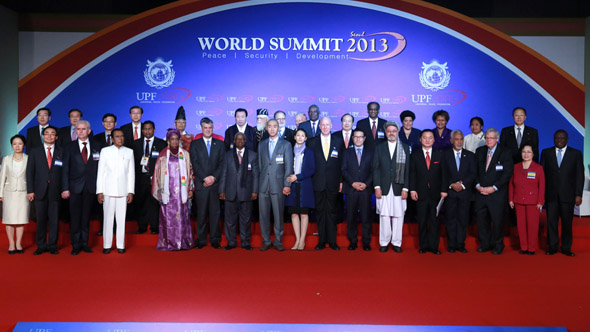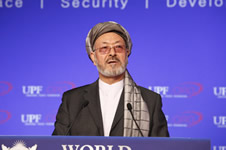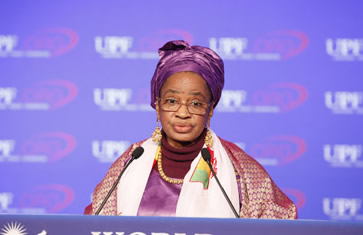- Home
- Over de UPF / Visie
- Komende Activiteiten
- Ambassadeurs voor Vrede
- Vredesinitiatieven
- Projecten
- Conferenties
- Publicaties
- Links
- Gastenboek
- Neem contact met ons op
UPF - Secretariaat
Kamelenspoor 60
3605 EC Maarssen.
Tel: 0346-572989
Tel: 070-3835938
E-mail:
info@upf-nederland.nl
Citaten
"Een mens begint pas te leven zodra hij voorbij gaat aan zijn eigen beperktheden en zich betrokken gaat voelen bij het wel en wee van de mensheid"
Martin Luther King Jr.
"Ieder mens is geweldig omdat ieder mens kan dienen. U hoeft geen diploma van de universiteit te hebben om te kunnen dienen; u hoeft Plato en Aristoteles niet bestudeerd te hebben om te dienen. U hoeft de relativiteitstheorie van Einstein niet te kennen om anderen te dienen. Alles wat u nodig heeft is een hart vol dankbaarheid"
Martin Luther King Jr.
"Je moet eerst zelf veranderen wil je de verandering in de wereld zien."
Mahatma Gandhi.
"Kunt u zich herinneren hoe theorieën over elektrische stroom en onzichtbare golven bespottelijk werden gemaakt? De kennis over de mens staat nog steeds in de kinderschoenen."
Albert Einstein.
"Er komt geen vrede tussen de volkeren zonder dat er vrede komt tussen de religies."
Hans Kung.
"Zalig zijn de vredestichters want zij zullen Gods kinderen genoemd worden."
Jezus, Mattheus 5:9
"Het eerste wat we moeten doen is Gods rijk in ons zelf zoeken. Daar ligt de vrede. Zodra we de vrede gevonden hebben, hebben we onze steun gevonden en tevens onszelf."
Jnayat Khan.
Indien iemand je een vuistslag geeft, doe dan niet hetzelfde. Ga naar zijn huis en zoen zijn voeten."
Sikhismen, Adi Grant.
"Als je naar God gaat dan vind je vrede in je hart."
Islam, Koran.13.28
"God is vrede, Zijn naam is vrede en alles is samen gebundeld in vrede."
Jodendom,
Zohar, Leviticus 10b
“Door Zijn genade kun je absolute vrede vinden."
Hindoeisme,
Bhagavad Gita 18.61.62
Nieuws vervolg:
 World Peace Summit richt zich op vrede, veiligheid en ontwikkeling.
World Peace Summit richt zich op vrede, veiligheid en ontwikkeling.
Seoul, Korea - Nationale vlaggen flankeerden de lobby van het Sheraton Grande Walkerhill Hotel terwijl 800 afgevaardigden uit 91 landen de UPF's World Summit 2013 in Seoul, Korea op 22-25 februari bijwoonden.
 "Vrede en veiligheid zijn zegeningen die van God komen en het is daarom van vitaal belang om alle leren die van God komen te gebruiken en wijze en gedurfde maatregelen te nemen die duurzame vrede en veiligheid garanderen," verklaarde Mohammad Karim Khalili, vice-president van Afghanistan. Hij opende de sessies die werden bijgewoond door staatshoofden en regeringsleiders uit Europa, Afrika, en Azië alsmede First Ladies en voorzitters van de Nationale Assemblies.
"Vrede en veiligheid zijn zegeningen die van God komen en het is daarom van vitaal belang om alle leren die van God komen te gebruiken en wijze en gedurfde maatregelen te nemen die duurzame vrede en veiligheid garanderen," verklaarde Mohammad Karim Khalili, vice-president van Afghanistan. Hij opende de sessies die werden bijgewoond door staatshoofden en regeringsleiders uit Europa, Afrika, en Azië alsmede First Ladies en voorzitters van de Nationale Assemblies.
De voorzitter van UPF, dominee Hyung Jin Moon, verwelkomde de deelnemers en beschreef zijn ouders' visie van een nieuw mondiaal tijdperk waarin alle mensen met een houding van liefde bij elkaar komen en de barrières van nationaliteit, ras en religie zullen overwinnen" (Voor een video van zijn toespraak
klik op deze
link
)
UPF voorzitter Dr Thomas Walsh legde uit dat de summit was gewijd aan de visie, het leven, het werk en de nalatenschap van wijlen UPF oprichter dominee Dr. Sun Myung Moon, die op 03 september 2012 is overleden. Dominee Moon sprak over 22 februari als het keerpunt in de geschiedenis van de voorzienigheid, het begin van een nieuw tijdperk van vrede en een wereld waarin alle mensen samen gaan leven als een familie onder God. Deze spirituele visie werd gedeeld door de deelnemers en sprekers van de conferentie, die de opmerkelijke veranderingen die nu in de hele wereld plaatsvinden, beschreven.
 De First Lady van Mali, mevrouw Mintou Doucoure Traore, sprak over de invasie van het noordelijke deel van haar land door jihadisten en drugshandelaars en het feit dat grote aantallen mensen ontheemd zijn en lijden, niet alleen door het gebrek aan voedsel, maar ook door de verkrachting van vrouwen en meisjes. Ze sprak haar waardering uit voor de interventie van Frankrijk en omliggende landen en vrienden van Mali. "In de naam van onze gemeenschappelijke menselijke familie, in de naam van de mensheid, doe ik een beroep op uw hulp voor mijn land, ons land, Mali, om uit deze gevaarlijke impasse te komen"
De First Lady van Mali, mevrouw Mintou Doucoure Traore, sprak over de invasie van het noordelijke deel van haar land door jihadisten en drugshandelaars en het feit dat grote aantallen mensen ontheemd zijn en lijden, niet alleen door het gebrek aan voedsel, maar ook door de verkrachting van vrouwen en meisjes. Ze sprak haar waardering uit voor de interventie van Frankrijk en omliggende landen en vrienden van Mali. "In de naam van onze gemeenschappelijke menselijke familie, in de naam van de mensheid, doe ik een beroep op uw hulp voor mijn land, ons land, Mali, om uit deze gevaarlijke impasse te komen"
De Toestand van de Europese Unie: bijdrage van Willem F. van Eekelen aan de 2013 UPF conferentie in Korea
Hieronder vindt u de toespraak van Willem van Eekelen aan de conferentie
Looking around the world it is hard to find a model of integration and common destiny like the European Union is providing after the second world war. Conceptually, the most interesting point is the approach of people like Schuman, Monnet and Adenauer to solve age-old problems by putting them in a new context. Rivalry between France and Germany first was restrained by the Coal and Steel Community, which made nationalist military expansion of a single coutry impossible. A subsequent attempt at a European Defence Community failed, because it was a bridge too far. Instead the focus was on the formation of a single economic market with a level playing field under the rule of law.
The construction of Europe was an interesting mix of competition and solidarity. Competition among firms regardless of their nationality. Solidarity with less developed regions. The set up was “sui generis” : a Commission proposes, decisions are taken by a Council of Ministers, on most issues with qualified majority, and with co-decision by the European parliament. A Court of Justice enforces implementation of directives and regulations throughout the Union. And even beyond, because countries like Norway and Switzerland follow suit even if they did not participate in the decision making..
The process of enlargement probably was the greatest foreign policy achievement: giving the new democracies of Eastern Europe a sense of belonging and support on reforming their governments in terms of accountability and accountability. I assume that the countries of the Western Balkan over time will also join the EU and I hope Turkey as well. But the criteria for enlargement have hardened, which may seem unfair to the new candidates. The financial crisis has made us look much harder at the way member countries follow up their promises. A new word entered our vocabulary : moral hazard. It means the risk that certain countries slow down on the implementation of their commitments when the pressure slackens and thus harm the countries which were fully compliant. That was the reason why the decisions to restructure financial oversight of national budgets and the banking system took so long. Support for those in trouble would only be acceptable if it was clear that they would do their utmost to honour their commitments, even if this meant painful adjustments and austerity. I suppose UPF has a different notion of ‘moral hasard’ but I hope you understand what I meant !
Of course the EU is not perfect. On the internal market we are doing relatively well but economic policy coordination has been weak. We built a Monetary Union but failed on the indispensible corollary of Economic Union. Instead we have used vague terms like Political Union, a term few people understand and which even may frighten them. Fear of a Super State – whatever that might be – is grossly exaggerated, because all 27 members participate in virtually every decision taken in Brussels. But it is a fact that more and more people see European integration as threatening, because they experience it as a process which keeps on rolling forward without them having control over it. Also that is an exaggeration, because since the Treaty of Lisbon the European parliament has real powers, as shown during their handling of the financial crisis, the so-called six-pack. Therefore I find accusations of the EU being undemocratic, grossly untrue. The European Parliament is not less democratic than most national parliaments.
That brings me to foreign, security and defence policy, which is organised in a different manner, more in the way of a traditional intergovernmental conference with unanimous decision making. We have tried to improve the structure by combining the High Representative, now Lady Ashton, with that of Vice President of the European Commission, thus forging an integrated approach She chairs the council of Foreign Ministers and is the head of the European Defence Agency and the European External Action Service. Today, the EU has delegations abroad which are responsible for the entire spectrum of its activities.
Where the EU falls short of expectations is the field of security and defence. We talk of ‘pooling and sharing’ but in fact maintain defence establishments which do very little together. That is untenable at a time of shrinking defence budgets and will harm the competitivity of European industry. But the basic approach is correct : the link between security, development and good governance. We like to work together with regional organisations like the African Union and ASEAN in South East Asia. The EU has mounted some 24 operations, most of them of a civil-military character. A most successful mission has monitored the peace process in Aceh, where the guerrillas handed in their arms and the army withdrew forces correspondingly.
In December the European Council will devote a session to defence policy and countries are already gearing up by preparing white papers aimed at a new vision of security. A vision which, I hope, will show a greater sense of responsibility in Europe to contribute to peace and security in the world.
Peace requires hard work. It is not something which floats down from the air, but is the result of using all instruments available to the international community. Without a minimum of security there cannot be development and our efforts would be wasted. But in the long run there cannot be stability and security without lasting development. It has taken some time for the ‘developers’ and the ‘security sector’ to see the essential connection. That’s why I am grateful to the UPF for organising this conference under the heading of ‘Peace, Security and Human development’, for we’ll make progress only if these three remain inextricably linked.
De Universal Peace Federation
is opgericht door Dr. Sun Myung Moon op 12 september 2005 in New York tijdens een vergadering van de Interreligieuze en Internationale Federatie voor Wereldvrede. De federatie is een NGO met een raadgevende status naar de ECOSOC (de Economische en Sociale Raad binnen de VN).
De federatie werkt aan een wereldwijde cultuur van vrede die alle nationaliteiten, religies, rassen en culturen omvat.
De Federatie gaat er vanuit dat:
- God bestaat als schepper en ouder van de hele mensheid
- de mens in zijn essentie een spiritueel en moreel wezen is.
- het gezin de school van liefde is en de bouwsteen voor wereldvrede.
- de hoogste standaard voor menselijke verhoudingen een leven voor anderen is.
- interreligieuze samenwerking essentieel is voor wereldvrede.
Citaten uit Dr. Moon’s vredesboodschap:
De spil van het universum:
"Als we God zelf zouden vragen wat het centrum van het universum is , zou Hij ons zeggen dat het de relatie tussen ouder en kind is. Niets is meer betekenisvol dan dit. De ouder kind relatie definieert ook de fundamentele verhouding tussen God en mens."
Een wereld van vrede:
"De hemel is een wereld gevuld met ware liefde, waar iedereen altijd en overal ware liefde inademt. Het is een plek waar de hele schepping en alle mensen onafscheidelijk met elkaar verbonden zijn, zoals de cellen in ons lichaam."
De geestelijke wereld:
"De geestelijke wereld bestaat werkelijk. Zij komt niet voort uit ons verlangen of onze verbeelding. Wij kunnen ook niet kiezen of we er wel of niet heen gaan. Net zoals God eeuwig en onveranderlijk is, zo ook is de geestelijke wereld eeuwig en onveranderlijk."
Over ware liefde:
"De essentie van ware liefde is niet om zelf gediend te worden, maar het is geven en dienen voor het welzijn van anderen. “ “Ware liefde geeft, vergeet dat zij gegeven heeft en gaat zonder ophouden door met geven. Ware liefde geeft met een blij hart. De kracht van ware liefde is sterk genoeg om alle barrières af te breken die gevallen mensen opgebouwd hebben."